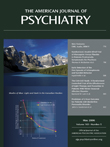Treating Disturbances in the Relationship Between Mothers With Bulimic Eating Disorders and Their Infants: A Randomized, Controlled Trial of Video Feedback
Abstract
Objective: Maternal eating disorders interfere with parenting, adversely affecting mother-infant interaction and infant outcome. This trial tested whether video-feedback treatment specifically targeting mother-child interaction would be superior to counseling in improving mother-child interaction, especially mealtime conflict, and infant weight and autonomy. Method: The participants were 80 mothers with bulimia nervosa or similar eating disorder who were attending routine baby clinics and whose infants were 4–6 months old. They were randomly assigned to video-feedback interactional treatment or supportive counseling. Both groups also received guided cognitive behavior self-help for their eating disorder. Each group received 13 sessions. The primary outcome measure was mealtime conflict; secondary outcome measures were infant weight, aspects of mother-infant interaction, and infant autonomy. Results: Seventy-seven mothers were followed up when their infants were 13 months old. The video-feedback group exhibited significantly less mealtime conflict than the control subjects. Nine of 38 (23.7%) in the video-feedback group showed episodes of marked or severe conflict, compared with 21 of 39 (53.8%) control subjects (odds ratio=0.27, 95% confidence interval=0.10 to 0.73). Video feedback produced significant improvements in several other interaction measures and greater infant autonomy. Both groups maintained good infant weight, with no differences between groups. Maternal eating psychopathology was reduced across both groups. Conclusions: Video-feedback treatment focusing on mother-infant interaction produced improvements in interaction and infant autonomy, and both groups maintained adequate infant weight. To the authors’ knowledge, this is the first controlled trial to show key improvements in interaction between mothers with postnatal psychiatric disorders and their infants.



